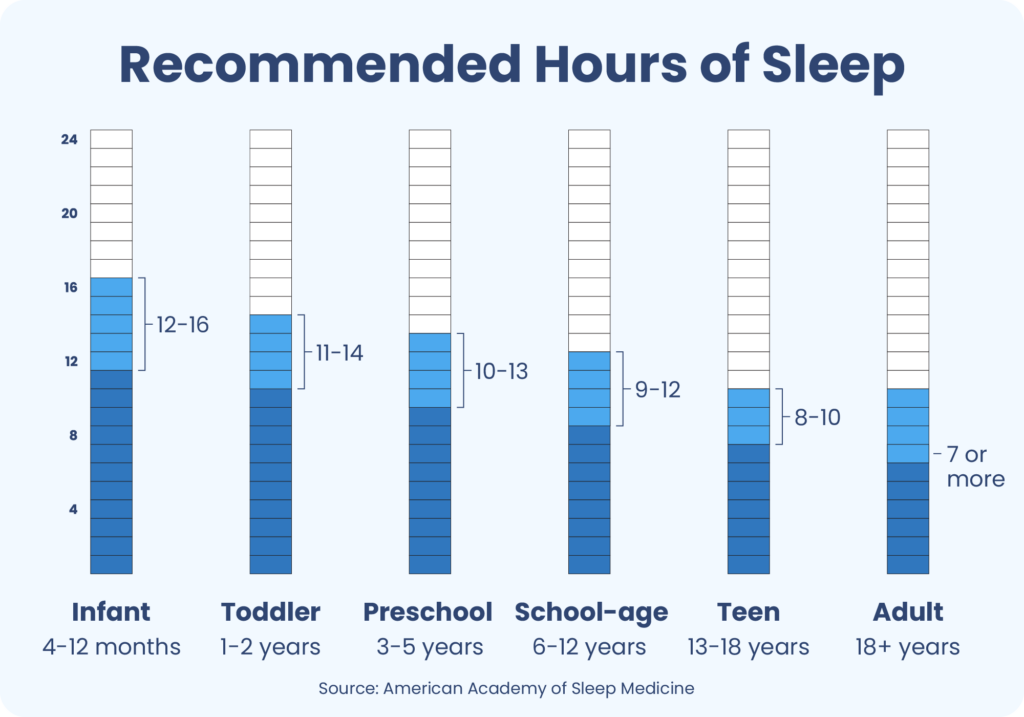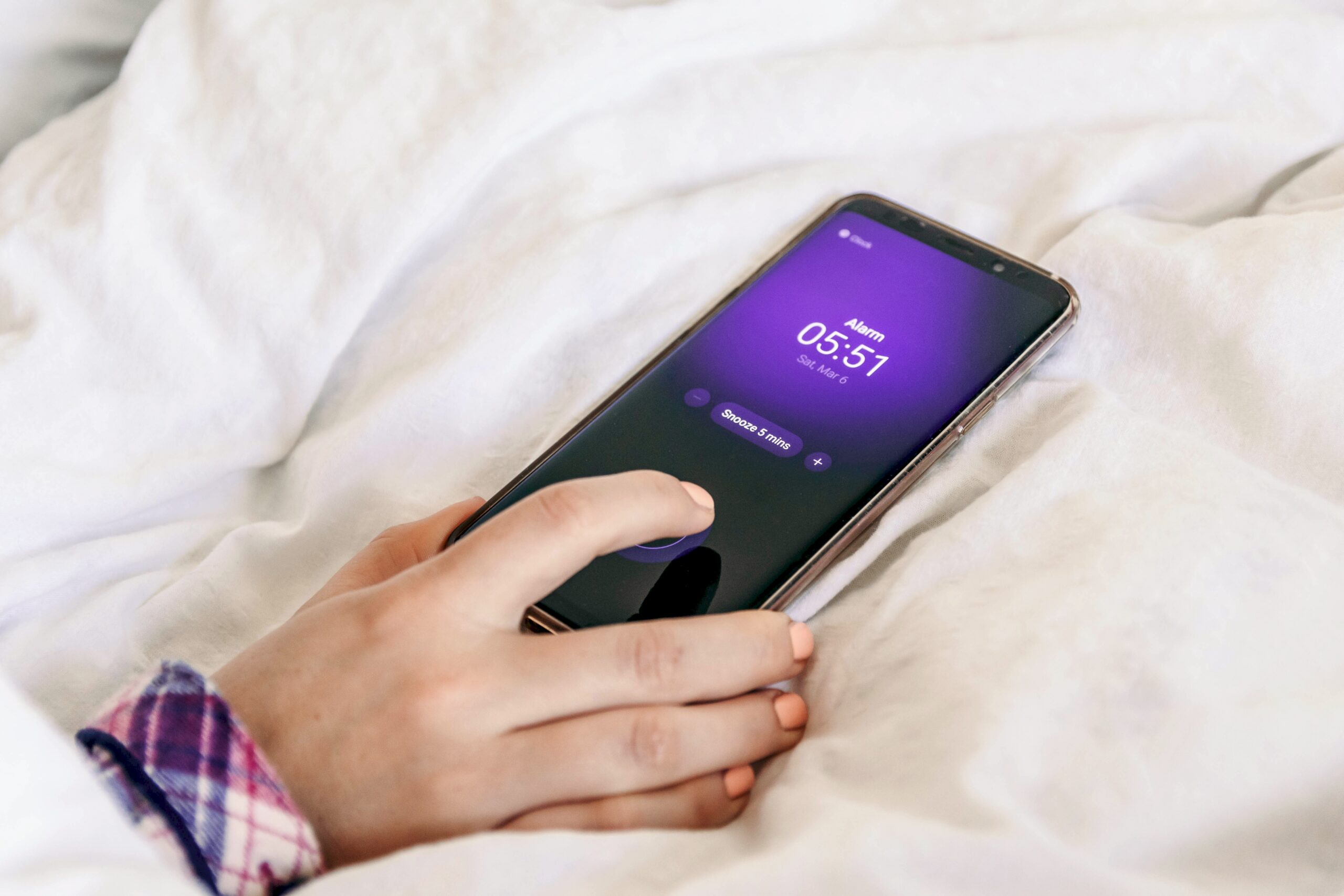Episode 2
TL;DR
- The advice of 8 hours of sleep a day is already “conventional wisdom” disproved on the Internet.
- According to the National Sleep Foundation, daily sleep requirement varies with age. An adult should sleep between 7 and 9 hours.
- It’s essential to distinguish between sleepiness and fatigue. Sleepiness manifests itself as a feeling of heaviness in the eyelids and difficulty in staying awake, while fatigue is often associated with a lack of energy and motivation, as well as mental exhaustion.
- To promote quality sleep, we recommend maintaining a regular sleep routine, waking up at the same time every day, including weekends.
Snooze! Everybody knows that this is the button to press to delay the alarm. For some, it’s almost a Pavlovian reflex. For me, it’s more like my brain is stealthily turning on and coming up with excuses: “I went to bed too late”, “I haven’t recovered enough”, “Just a little longer”. Today, we’re going to see what kind of reaction you should have. Come on, now’s not the time to doze off…
How much sleep do we really need?
The modern reflex is to ask Google1 or Bing Chat (ChatGPT)2 about our sleep requirement, and stop relying on the ‘popular wisdom’ of 8 hours of sleep a day. I’ve tested it for you: in both cases, you get not only a nuanced answer, but one that’s well-sourced.
For example, the Sleep Foundation proposes a number of time ranges according to age group. Sleep requirement3 for newborns is 14 to 17 hours. That of an adult would be between 7 and 9 hours (this range could even be extended to 6-10 hours if we wanted to take into account certain extreme cases, which are admittedly much rarer than we think).

I can only imagine what you’re thinking when faced with such a wide range: “What about me?” Forget all that, I’ve got something simpler…
What are the signs of sleepiness?
Before I do that, let me make a little distinction: sleepiness is not fatigue. Sleepiness implies heavy eyelids, difficulty staying awake, sudden jolts of attention. Fatigue, on the other hand, is often associated with low energy, low motivation and mental exhaustion.
When I watch an episode of Primitive Technology4 on YouTube in the evening (I don’t know why it relaxes me), if I suddenly realize that I don’t know how he came to amalgamate iron, I’m sleepy. If I feel exhausted but still able to keep up, I’m fatigued (or simply tired).
While we’re at it, watch out for daytime sleepiness! If you happen to fall asleep in the middle of the day, and even worse while driving, you’re clearly sleep-deprived and need to make it your priority!
If we had to keep just one piece of advice?
So here’s the real tip of the day: keep to a regular waking schedule (yes, even on weekends). Your body will eventually adapt fairly quickly to this routine and send you sleepy signals in the evening to adjust to it.
Speaking of waking up, do you also have a default ringtone for your telephone alarm? And have you ever, like me, had that furtive knot in your stomach when you hear it on the street or in the subway? Personally, I’ve switched to vibration mode, but for those of you who have a hard time waking up, why not combine it with some music you like? A 2020 study5 demonstrated its benefits. Don’t hesitate to tell me about your experience…
So regularity is what’s important for our sleep. In this sense, it’s different from our nutrition, which can be smoothed out over a week (thanks in particular to our capacity to have energy reserves). So alternating nights of 4 then 10 hours is clearly more tiring than 7 hours every night.
Remember, when the alarm goes off, it’s simple: wake up. Of course, sleep isn’t just about quantity, and I’ll come back later to the subject of sleep hygiene or what to do when your brain is buzzing (I’ve even been woken up by new ideas to integrate into libra…).
Here’s a personal hack: the power nap. Particularly in the early afternoon, it’s invigorating enough to keep you going into the evening… I’d like to thank my first company for introducing me to it…
Fun Fact
Knocker-up6 is a trade that first appeared during the Industrial Revolution, then disappeared completely in the 1970s. Knocker-uppers used to wake people up, especially workers, for a few cents so they wouldn’t be late for work. Do any of you feel that you still play this role for your brother, sister or spouse?
Going further
References
- https://www.google.com/search?q=how+much+sleep+do+we+need ↩︎
- https://www.bing.com/search?q=how+much+sleep+do+we+need ↩︎
- Paruthi S, Brooks LJ, D’Ambrosio C, et al. Consensus Statement of the American Academy of Sleep Medicine on the Recommended Amount of Sleep for Healthy Children: Methodology and Discussion. J Clin Sleep Med. 2016;12(11):1549-1561. Published 2016 Nov 15. doi: 10.5664/jcsm.6288. https://pubmed.ncbi.nlm.nih.gov/27707447/ ↩︎
- https://www.youtube.com/channel/UCAL3JXZSzSm8AlZyD3nQdBA ↩︎
- McFarlane SJ, Garcia JE, Verhagen DS, Dyer AG. Alarm tones, music and their elements: Analysis of reported waking sounds to counteract sleep inertia. PLoS One. 2020;15(1):e0215788. Published 2020 Jan 28. doi: 10.1371/journal.pone.0215788. https://pubmed.ncbi.nlm.nih.gov/31990906/ ↩︎
- https://en.wikipedia.org/wiki/Knocker-up ↩︎

